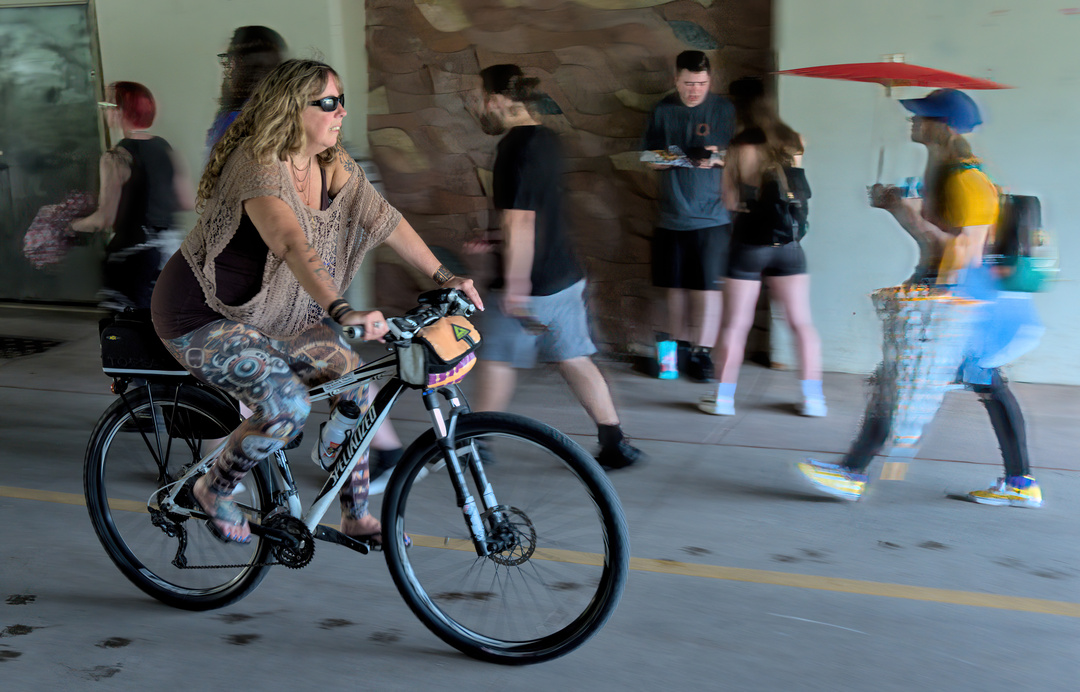Opinion: Prioritize pedestrians in Boulder’s public commons

Wednesday, May 31, 2023
City Council on June 1 will discuss allowing e-bikes on some open space trails. Watch online, YouTube or Channel 8 (TV). Attend in person: 1777 Broadway. Meeting starts at 6 p.m.
By Richard Kiefer
BBOP
More Personal Transportation Devices (PTD’s) are being used in Boulder to enhance personal mobility, on roadways and other public spaces. These are devices such as pedal-cycles of all types, electric bicycles, mopeds, scooters, and skate boards.
The City of Boulder encourages the use of such alternative transportation vehicles to reduce motor vehicle congestion and CO2 emissions. Some types of PTDs, such as bicycles and scooters, can be rented easily at multiple locations around town.
Experience to date shows that people using these conveyances will go most anywhere they please, sometimes sacrificing their own safety and the safety of others. While PTDs can be convenient and improve personal transport efficiency, some rules should be implemented for their use in the public realm. Such rules should focus on public safety, be easy to understand, be easy to enforce, and not severely compromise the convenience of using PTDs.
The rules suggested here are based on the following assumptions:
- When off the public streets, people using PTDs will likely go anywhere they please.
- When on the public streets most people using PTDs will obey the rules of the road.
- The safety of users and others is the most important consideration in regulating the use of PTDs.
- The convenient use of PTDs is important but secondary to safety.
- The rules applied to the use of PTDs must be simple to understand and enforce.
I suggest the following simple set of guidelines and definitions which could form the
basis for a City ordinance which could enhance the safety and effective use of PTDs. These suggestions are based on the premise that when a PTD is used on public roads, the rules of the road must apply. For PTD use in off-road public places, privilege of use (right of way) is inversely proportional to the power and/or mechanical advantage provided by the conveyance.
A Boulder City ordinance governing the public use of Personal Transportation Devices could read as follows –
1. When using the public roadway, PTD users must adhere to the rules of the road regardless of the type of device.
2. When using other public spaces that are not roads, such as sidewalks, paths, parks, trails, etc., behavior is governed by the following:
- Pedestrians have the right of way over all mechanized means of personal transportation.
- Exclusively human powered PTD’s must yield to pedestrians at all times.
- PTD’s which utilize any auxiliary power must yield to exclusively human-powered PTDs and pedestrians at all times.
- PTDs may be prohibited in some public places, such as the Pearl Street Mall and parts of the University of Colorado campus.
In practice how would such a city ordinance work? Pedestrians, who are now frequently endangered by bikes and skate boarders, would benefit the most. (Editor’s note: In a study of collisions from 2015-2019, there were no serious crashes between pedestrians and bicycles on sidewalks or multi-use paths in Boulder. Skateboard data was not reported.)
Bikes, electric bikes, skate boards, and other devices would be required to yield to pedestrians on sidewalks, multi-use paths and in parking lots. The PTD users, if inconvenienced by too many pedestrians, might find alternate routes. Electric bikes, which routinely cause near collisions with regular bikes and pedestrians, would yield priority on multi-use paths, in bike lanes and on sidewalks. If everyone knows and acknowledges the order of priorities for PTDs, safety for everyone can be enhanced and stress reduced.
Any city ordinance will include certain definitions of terms for reference by citizens, police, and courts in gaining compliance. Definitions must be broad enough to include PTDs which will appear in the future. Here are three necessary terms:
Personal Transportation Device (PTD): Any mechanical device which increases the efficiency
of human transportation mobility over that of walking.
Human powered PTD: Any mechanical device which converts human-only energy into motion for the purpose of transportation. Examples: pedal-cycles of all types (bicycle, tricycle, unicycle, etc.), scooters, skate boards, roller skates, roller skis, skis and other devices yet to be invented.
Auxiliary powered PTD: Any mechanical device which uses a source of energy other than, or in addition to human energy, to provide motion for the purpose of transportation. Examples: motorcycle, moped, motorized bicycle, motorized scooter or skateboard, Segway and other devices yet to be invented.
Richard Kiefer has been a Boulder resident since 1970, working as a design engineer (BSEE, MSEE) for several large corporations and as an independent wireless design consultant since 1981. More about Richard
Boulder Beat Opinion Panel members are writing in their own capacity. Their views do not necessarily reflect those of Boulder Beat. Got a different take? Write a Guest Opinion using our op-ed and comment guidelines or submit an application to join the Opinion Panel. Opinion BBOP bicycles bicycling Boulder Boulder Beat Opinion Panel city of Boulder cycling e-bikes multi-use paths opinion sidewalks speed transportation
Opinion BBOP bicycles bicycling Boulder Boulder Beat Opinion Panel city of Boulder cycling e-bikes multi-use paths opinion sidewalks speed transportation

